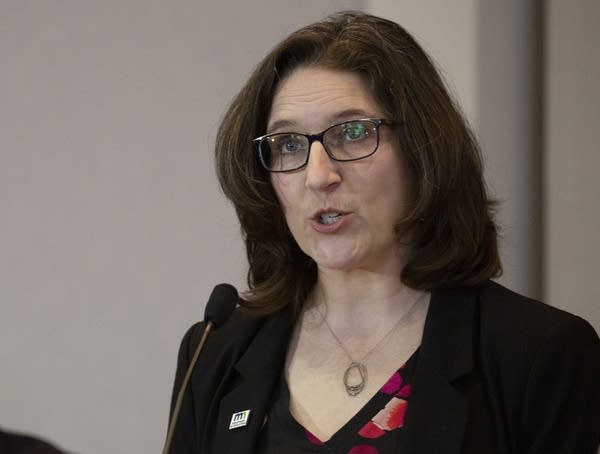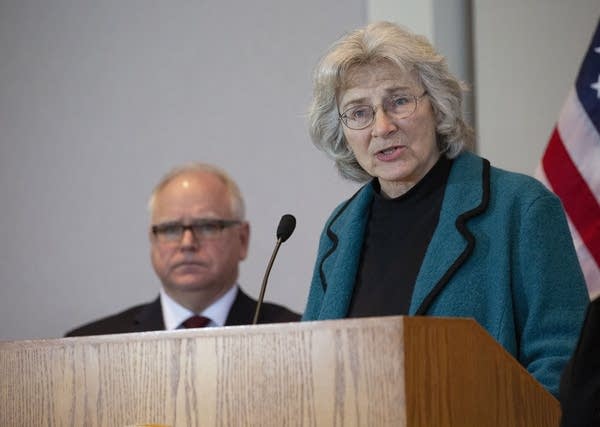Walz announces temporary closure of Minnesota K-12 public schools

Go Deeper.
Create an account or log in to save stories.
Like this?
Thanks for liking this story! We have added it to a list of your favorite stories.
Updated: March 15, 8 p.m.
Minnesota Gov. Tim Walz announced Sunday that he is ordering K-12 public schools across the state to close by Wednesday and remain closed through March 27 in an effort to slow the spread of COVID-19.
"While children have proven to be less vulnerable to this virus (and) we haven't seen significant spreading in our schools, we do anticipate that COVID-19 will have a sizable impact on our education system in the coming weeks, months and potentially the coming year," Walz said at a news conference Sunday. "We cannot wait until the pandemic is in our schools to figure things out."
Walz said teachers, administrators and staff will use the closure to prepare for a possible longer-term need for online learning.
"This time period is to allow our school districts to adapt, to prepare for distance learning and to do the things that we need to do that are multi-fold when a decision like this is made," he said. "And I want to be very clear about this: A decision to close school has a magnitude of consequences. (This) will change life in Minnesota."
Turn Up Your Support
MPR News helps you turn down the noise and build shared understanding. Turn up your support for this public resource and keep trusted journalism accessible to all.
The news comes as Walz said Minnesota's number of confirmed COVID-19 cases rose to 35 on Sunday, up from 14 on Friday and 21 on Saturday.
Walz's office said his emergency executive order “requires schools to provide care for elementary-age children of health care professionals, first responders, and other emergency workers" so those individuals can stay on the job. It also "makes provisions for the continuity of mental health services and requires schools to continue providing meals to students in need."

Education Commissioner Mary Cathryn Ricker said at Sunday’s news conference that schools should continue to pay hourly workers and other staff. She said the period of closure is to prepare educators to be able to teach as well as feed students at home.
“I am stressing to use this time, this whole time, to plan,” she said. “We are not accommodating a couple snow days. We are planning for the potential of weeks of distance learning delivery.”
The decision affects more than 850,000 K-12 students and more than 135,000 teachers and staff in public K-12 schools across the state.
Some districts have already announced plans to close Monday and Tuesday — including St. Paul, where classes won’t be held Monday and Tuesday but teachers should still report. St. Cloud, Brainerd, Stillwater and Roseville are among the other districts closing Monday and Tuesday.
Minneapolis Public Schools will hold classes on Monday, but close on Tuesday.
State officials had grappled for days on whether to let classes proceed, as other states — including Wisconsin — called off school in an attempt to slow the spread of the virus. Walz had said it was a tough call because closing schools would create hardship for parents and take kids out of an environment where some depend on meals and daytime care.
There also were concerns such a move could draw down the number of available nurses and other professional medical staff who’d need to stay home with their kids if schools were shut.
Walz said Sunday that he moved to close schools once he saw a plan that would address those concerns. He said it’s a work in progress, but “we can't let the perfect get in the way of the good on some of these decisions, and it is that fine line between decisive, immediate action but with a plan that happens afterwards. We know in Minnesota... there is no more comprehensive plan on how to deal with school closure on a statewide level in the country than we have right now."
Child care centers also received guidance from the state Sunday. A communication from the Department of Human Services says working parents “need you and your staff to stay well and stay open to provide a safe and nurturing space for our children.” The Childcare Assistance Program and Early Learning Scholarship will continue, the state said. The guidance adds that it will extend expiration dates for “any license in good standing” during the state of emergency.
Those looking for options may call Child Care Aware of Minnesota at 1-888-291-9811.
Further closures possible
While some parts of the country moved to close down bars and restaurants, Walz said Sunday that he was not yet ready to take such a step.
"That may become an option... (but) we want to make that decision for them, not to be a decision of protecting public health or going bankrupt and losing your business. We want them to be able to weather this, stay in business," Walz said, noting that "day-to-day, changes our reality."
State officials urged businesses to get workers to telecommute as much as possible. And they said they are looking at ways to give hourly workers assistance if their places of business have to shut down.
"I think we would hope that employers protect workers," said Steve Grove, commissioner of Minnesota's Department of Employment and Economic Development. "If you can decrease hours versus let people go, that is always better, and there are ways that the state can help you do that."

Other Sunday developments
Among other coronavirus-related developments on Sunday in Minnesota:
Additional closures were announced, including:
The St. Paul Public Library said it will be closed March 16-27.
The Rochester Public Library will close starting March 18.
All St. Paul Parks & Recreation recreation and community centers, municipal athletic facilities, the Great River Water Park, and Como Park Zoo and Conservatory will be closed from March 16-27.
Minneapolis Park and Recreation Board recreation centers and program buildings will be closed to the public from March 17 through April 5.
AFSCME Council 5 announced it is closing its offices until further notice due to a potential case of COVID-19 among its staff. Staff members will remain available via phone and email.
The newly renovated Armed Forces Center at the Twin Cities airport's Terminal 1 is closing at 4 p.m. March 18, and anticipates staying closed for a month. It cited defense department travel restrictions and potential exposure of volunteers to travelers carrying the virus.
St. Paul Mayor Melvin Carter declared a State of Local Emergency in response to the coronavirus outbreak.
In addition to closing city libraries and recreation facilities, the city will not issue any new permits for gatherings of 50 or more people.
Carter also requested that Ramsey County Sheriff Bob Fletcher suspend all evictions within the city, and said worker’s compensation coverage will be provided for city fireighters and police officers who are exposed to or contract COVID-19 on duty.
Mayo Clinic is limiting patients' visitors at all three of its sites while there is a threat of COVID-19 transmission.
In Rochester, patients can only have two visitors at a time, and they'll be screened for respiratory illness.
At Mayo's site in Arizona, the rules are similar and children under 13 years old will be allowed on campus only if they are getting care.
At Mayo in Jacksonville, Florida, no patients' visitors are allowed. There, Florida's Incident Command System will consider exceptions to this policy on a case-by-case basis.
Similar restrictions are in place for some facilities in Mayo's health care system in Wisconsin and southern Minnesota.
Essentia Health announced new visitor restrictions at its hospitals. No visitors are allowed, except in the following cases
Visitors for inpatients only will be allowed based on compassionate-care needs. Family members are advised to call the hospital before coming.
Emergency departments will allow one visitor for pediatric, vulnerable adult, trauma or other patients requiring communication to a health care team on their behalf.
One adult visitor will be allowed for each pediatric patient, and labor and delivery patients. In the neonatal intensive care unit, one parent is allowed to visit at a time.
No visitors who are ill will be allowed.
Xcel Energy announced Sunday it will not disconnect residential customers’ electric or natural gas service until further notice.
“The energy grid is essential to the nation’s critical infrastructure and we’re taking a well-planned, heightened approach to all threats, including COVID-19," Brett Carter, Xcel's executive vice president, Chief Customer and Innovation Officer, said in a news release. "We will work with our customers, our communities and government leaders to ensure the lights and heat stay on and that those we serve are cared for and protected.”
The Hennepin County Sheriff’s Office has canceled all social visitation with inmates at the Hennepin County Jail in Minneapolis.
“We do not take this decision lightly,” Sheriff Dave Hutchinson said in a news release. “We know how important it is to our inmates to stay in touch with families and how important it is for families to see their inmates. The most important consideration for us, though, is the safety of our inmates and our detention center staff."
The Seward Community Co-op in Minneapolis said it has temporarily closed its Franklin Avenue store after a staff member tested positive for COVID-19.
The co-op says a crew will work to clean the store, which will reopen once managers determine there is no risk to customers. The co-op said the employee had worked a limited schedule in the past two weeks.
The Seward Co-op's Friendship store is not affected but will open later on Monday, to give employees time to re-stock the shelves.



